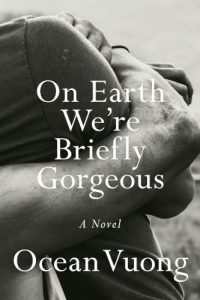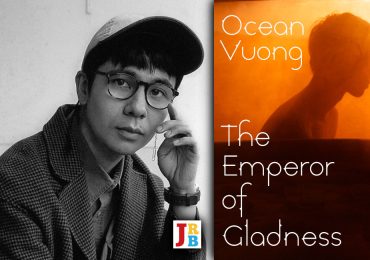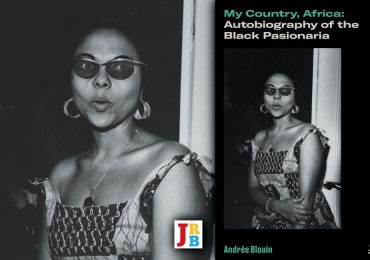Zanta Nkumane reviews Ocean Vuong’s devastatingly beautiful debut On Earth We’re Briefly Gorgeous, a novel about living in the margins, with the grace and ferocity to be.

On Earth We’re Briefly Gorgeous
Ocean Vuong
Penguin, 2019
1.
Queer bodies have always been described in the vernacular of those who are not queer themselves: misread and mistranslated, but also erased, because their mere presence counts as a resistance to the idea of the right way to be. The right way to love. The right way to inhabit space. To counter this, and make queerness legible, a valid text, a valid experience, is what Ocean Vuong’s work aims to do.
Thus the poems in his collection, Night Sky with Exit Wounds, ‘attempt to navigate history through a rewriting, or rather a recasting, of history into a mythology,’ as he says in a video for the 2017 TS Eliot Prize, which the collection won. ‘Writing the history of a queer body as a mythology has yet to be done,’ he continues.
Night Sky with Exit Wounds is a striking collection, a cascade of imaginative documentation: of himself, of his queer body, and of his immigrant family. Vuong foregrounds marginal people with sharp tenderness and necessary ugliness. His poems are testament to his intention to restore and enlarge the stories of those whom the glare of whiteness causes to be ‘disremembered’.
Vuong’s newly published debut novel, On Earth We’re Briefly Gorgeous, continues this project. The novel is a long letter to a mother who cannot read from her queer, Vietnamese–American son, Little Dog. The moniker Little Dog is derived from a Vietnamese tradition to give fragile-looking babies an ugly name so that evil spirits do not come for them. Written in the kishōtenketsu tradition, where the plot is without conflict, the novel follows Little Dog, his mother, Rose and his grandmother, Lan, all living in Hartford, Connecticut. The two women survived the Vietnam War and suffer from post-traumatic stress disorder, but do not have a name for it. The novel is also about Trevor, a white boy Little Dog meets while working on a tobacco farm. But most importantly, it is about living in the margins, with the grace and ferocity to be.
2.
Much of Vuong’s work is concerned with the corporeal. In his world, the body is a language and language is a body. The body is a location where joys and horrors live. The body is the page where marginality bends itself into breath. The body happens to the world, as much as the world happens to the body. Little Dog’s mother works at a nail salon and he notes how the long hours and the chemicals intercalate themselves into his mother’s body, her skin.
We will do it for decades—until our lungs can no longer breathe without swelling, our livers hardening with chemicals—our joints brittle and inflamed with arthritis—stringing together a kind of life. […] I hate and love your battered hands for what they can never be.
Little Dog doesn’t hate his mother’s hands, of course: he hates how working class, immigrant bodies wilt under the pressure of years of struggle and poverty; he hates the system that has made it permissible for his mother’s body to be subjected to caustic fumes and incinerating chemicals. He hates the myth of the American dream—a dream instructive in its name, as to whom it belongs.
Even now the nail salon
will not leave her: isopropyl acetate,
ethyl acetate, chloride, sodium lauryl
sulfate & sweat fuming
through her pink
I ♥ NY T-shirt
This stanza from Vuong’s poem ‘The Gift’ underscores how it never leaves you, the hard work, the burden, the survival—your body begins to smell of lack. Poverty smoulders in your pores until your death. The nail salon is emblematic of a twilight zone, where immigrant workers’ hopes and dreams decay. But it is also a place of communion: the workers cook Vietnamese food in the back and speak in their home language. In a perverse way, it’s where they feel most at home, amid fumes and foot rubbing.
I never wanted to build a ‘body of work’, but to preserve these, our bodies, breathing and unaccounted for, inside the work.
Take it or leave it. The body, I mean.
Even while placing an immense importance on the body, Vuong is also wary of it. Wary of its mortality, wary of its desires, with full knowledge that he cannot escape it. So by situating history, the present, and his oppression in the body, Vuong explores the body within the body—he writes to immortalise it, but also to erase it. For if you can erase the body, where can oppression manifest?
3.
We queer children come to sex in lack. Lacking knowledge. Lacking time. We are bellyful of shame the first time we fully succumb to our desires. When Little Dog sexually surrenders himself to Trevor, in a barn one night, it is the beginning of a poignant affair. The backbone of the relationship is an assortment of drugs, alcohol, anger and mess. Trevor and Little Dog partake in non-penetrative sex for some time. There is a recurrent shame that haunts their union, which by all societal norms cannot be. Trevor, white and American. Little Dog, Vietnamese and poor. As a queer and interracial coupling, theirs is a double transgression. Yet, in their shared, stormy shame, they find a momentary salve and harbour.
After he came, when he tried to hold me, his lips on my shoulder, I pushed him away, pulled my boxers on, and went to rinse my mouth. Sometimes being offered tenderness feels like the very proof that you’ve been ruined.
Queer desires are incongruent with the dominant, conventional social narratives that decide what is right and what is wrong. Even our small deaths don’t belong to us because shame incarnates itself in queer pleasure.
One night, Trevor asks Little Dog to just ‘do it’—have penetrative sex.
The sparks in my head bloomed with each thrust. After a while, the pain melted into a strange ache, a weightless numbness that swept through me like a new, even warmer season. The feeling brought on, not by tenderness, as from caress, but by the body having no choice but to accommodate pain by dulling it into an impossible, radiating pleasure. Getting fucked in the ass felt good, I learned, when you outlast your own hurt.
[…]I unconsciously reached back to touch myself, to make sure I was still there, still me, but my hand found Trevor instead—as if by being inside me, he was this new extension of myself.
It is clear that Little Dog adores Trevor, and longs to be subsumed by him at every turn. Trevor is the sun to Little Dog’s lightless planet. In this moment, Little Dog finally absorbs Trevor into himself. This beautiful, American thing is finally him. However, his crisis is how ill prepared he is for the sensation of having a penis inside of him. His body is traumatised, if somehow pleasurably, by the whole experience, but because his noble goal is to please Trevor he ‘outlasts his own hurt’ for him. A feeling of this tremendous effort stays with the body. These kind of feelings burrow into you, undo everything you have ever felt. Little Dog knows that with Trevor’s every heaving thrust something in him realigns, but something falls out of place, too.
But then:
A scent rose up to my head, strong and deep, like soil, but sharp with flaw. I knew right away what it was, and panicked. In the heat of it, I didn’t think, didn’t yet know how to prepare myself. The porn clips I had seen never showed what it took to arrive where we were. They just did it—quick, immediate, sure, and spotless. No one had shown us how this was to be done. No one had taught how to be this deep—and deeply broken.
[…]Ashamed, I pressed my forehead to my wrist and let it throb there.
Little Dog’s embarrassment is understandable, but because there is a naive gap in his knowledge about gay sex, his embarrassment is apocalyptic. His frustration stems from how he has muddied a moment that should have been pure, untouched by the outside world. Just their own. Gripped by shame, he shrinks into himself and notes: ‘His cock, touched at the tip with the dark inside me, pulsed under the lamplight as it softened.’ Seeing the ‘dark’ of him, this betrayal by his body, is emblematic of how stained he considers his existence to be, and now his otherness has contaminated his golden Trevor.
4.
Art and literature regularly juxtapose masculinities. Witness Xolani and Vija in John Trengrove’s Inxeba, Giovanni and David in James Baldwin’s Giovanni’s Room, Tshepo and Chris in K Sello Duiker’s The Quiet Violence of Dreams, and Chiron and Kevin in Barry Jenkins’s Moonlight. Little Dog and Trevor follow a similar tradition. Little Dog, of smaller stature and softer mannerisms, represents the illegible masculinity, the masculinity that exists outside of the hard, stoic, muscular archetype, which is the desired and approved masculinity. Deemed unmanly, the men who live outside of this archetype tend to be exposed to ridicule. Trevor, meanwhile, is the All American Boy, muscled, gun-toting, who listens to 50 Cent’s ‘Many Men (Wish Death)’ on loop, watches football, drinks beer, does drugs and asks Little Dog if he is ‘really gay’. He sounds irredeemable, but Trevor carves out a special, tender gap in all his hardness for Little Dog. It may not be consistent, but it remains at the underbelly of his time with him. Vuong gives Trevor a softness inside his tough carapace that makes him an endearing character—you hate and love him over and over.
Although it is never spoken, Trevor and Little Dog’s love for each other is palpable. Neither has any uncertainty about the other, unlike David in Giovanni’s Room, for example, who is riddled with doubt about Giovanni, indecisive about staying or leaving. Perhaps requited love never has to announce itself, it just is.
In an essay for the Paris Review, Vuong writes:
I was never comfortable being male—being a he—because all my life being a man was inextricable from hegemonic masculinity. Everywhere I looked, he-ness was akin to an aggression that felt fraudulent in me.
The insidious essence of masculinity is how it imprisons even those it privileges. It is understandable that Vuong would want to be free of this violence. To be forced to exist within a narrow set of directives on how to be, how to embody space, what to express, is an incarceration of a scalding kind. Trevor is able to float free of these strictures, sometimes, for knowing the mouth of another man.
5.
On Earth We’re Briefly Gorgeous is an elegant feat of language manipulation. Vuong bends and breaks English, as if he is of it. Interestingly enough, he only started speaking English at the age of eleven. As a non-native speaker, he came to English with his tongue already twisted to speak a certain way, his mouth already shaped for the tonal sounds of Vietnamese. The novel may be in English, but the Vietnamese that birthed the author’s voice is almost audible. Having to learn a new language on top of your mother tongue allows you to traverse the crevices of that language with an attention that its owners don’t possess, until you even dream in it.
In Vietnamese, the word for missing someone and remembering them is the same: nhớ. Sometimes, when you ask me over the phone, Con nhớ mẹ không? I flinch, thinking you meant, Do you remember me?
In siSwati, my mother tongue, a Nguni language, to miss someone and to remember them is also the same word: khumbula. You have to admire the economy. The efficiency of words with many meanings creates a language based on emotion: how the words sound and their context is where you find their heartbeat. English is a naming language, and because it names, it genders as well. Our languages do not have this. English gave us othering. In her poem, ‘mom’s language on fire’, Ashley Makue, a native Sesotho speaker, says:
in my mother’s language
quiet also means dead […]in my mother’s language
father also means man […]in my mother’s language
soul also means wind
At one point Little Dog, his mother and grandmother head down to the store. When they get to the butcher’s counter, his mother cannot find the word for ‘oxtail’. She resorts to using her body to communicate.
Floundering, you placed your index finger at the small of your back, turned slightly, so the man could see your backside, then wiggled your finger while making mooing sounds.
This is her attempt to communicate with the butcher, but he only laughs. When words fail, the body is your next conduit for communication. But sometimes, as an other, your body is illegible too. We speak of ‘body language’, alluding to the body as an object that can make its desires clear, but in this moment Little Dog’s mother’s body is ineffective. Living in a country not of your people with the inability to speak the language must be a deep isolation, one which only someone who lives it can articulate. Little Dog knows that language makes him near to his mother, but further away as well. He now speaks a second language she cannot: with every new English word he learns, his mother steps further away from him.
The novelist and academic Viet Thanh Nguyen says:
Writers from a minority, write as if you are the majority. Do not explain. Do not cater. Do not translate. Do not apologise. Assume everyone knows what you are talking about, as the majority does. Write with all the privileges of the majority, but with the humility of a minority.
On Earth We’re Briefly Gorgeous is testament to this. It is an archive of minority experience and a compendium of queer futurity that renders the queer masculine legible. Vuong says he may never write another novel. He may not need to: the bodies of Trevor and Little Dog that he has offered up to us speak truths that are enough.
- Zanta Nkumane holds a BSc degree from the University of Cape Town and a BA (Hons) in journalism from Wits University. His work has appeared on Genderlinks, OkayAfrica, This Is Africa, Mail & Guardian, HuffingtonPost SA & Kalahari Review. Importantly, he loves wine. Follow him on Twitter.





